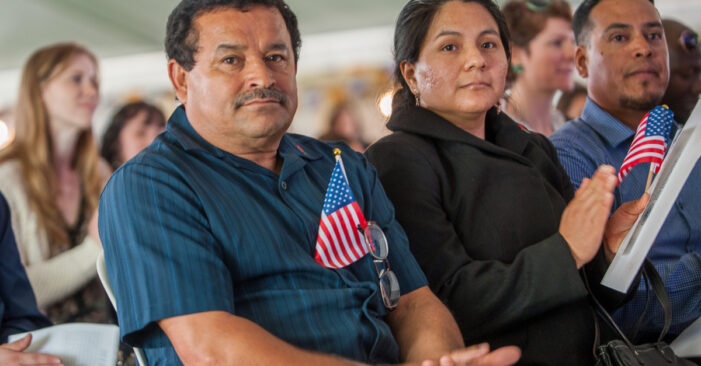American Naturalization
This year over 900,000 people will enter the U.S., both legally and illegally. Many will apply for naturalization. That means, if accepted, they will eventually become “naturalized U.S. citizens” with the same privileges and rights as natural born citizens. Naturalization records are comprised of a Declaration of Intention, The Petition and the Certificate of Naturalization. These records may also include depositions from people who have known the petitioner.
The Process
The naturalization process is comprised of three separate steps which make up the naturalization records. The Declaration (sometimes called the first papers) is an application that declares the person’s intent to become a U.S. citizen, renouncing any allegiance to foreign governments. The Petition for naturalization (sometimes called second papers) is filed after residency requirements are met. This document is considered the formal request for U.S. citizenship. If the candidate is accepted the final document placed in the naturalization records would be the Certificate of Naturalization or Certificate of Citizenship.
The Significance
Besides the obvious signs of U.S. citizenship which allows for all of the benefits and responsibilities of a natural born citizen, these naturalization records are also used by individuals attempting to construct their family history. Many times those on a genealogy search will need records filed before 1906, which are not filed with the U.S. Citizenship and Immigration Services. Online you can search the Naturalization Index which covers the years 1794 to 1995. On this site, there are searchable records by state. Although information the older records can be sparse, generally they at least include the petitioner’s name, date of birth (or age) and county of residence.
The Effects
The effects of completing the naturalization record process are the privileges and responsibilities of being a citizen of the United States. Some of these include serving on a jury, voting, getting a U.S. passport, participating in social security and Medicare. A naturalized student can take advantage of federal financial aid in the form of loans and grants. And a naturalized citizen can join any branch of the U.S. military.
The Considerations
Although many privileges are afforded the naturalized citizen, there are some rights not available to them. The U.S. Constitution states that only natural born citizens can be elected or put into the office, by succession, of President or Vice President of America. Also, a child born in the United State, regardless of the citizenship of his/her parentage, is an American citizen. And if a child is born outside of the country by parents who are American citizens, that child is considered a U.S. citizen as well.
Individuals requiring additional information regarding American naturalization should contact the U.S. Citizenship and Immigration Services at 800-375-5283. You may access application forms, immigration changes and educational resources on their web site.

